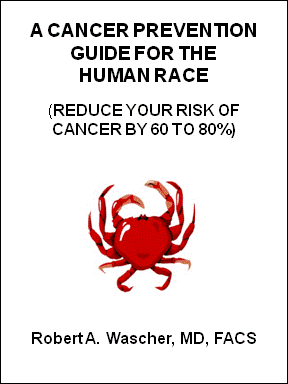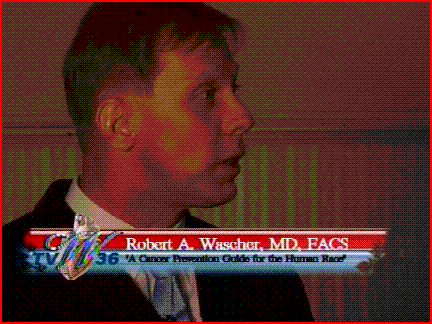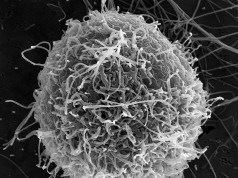By, Robert A. Wascher, MD, FACS
Updated: 06/14/2009
The information in this column is intended for informational purposes only, and does not constitute medical advice or recommendations by the author. Please consult with your physician before making any lifestyle or medication changes, or if you have any other concerns regarding your health.
Bone Marrow Stem Cell Transplant & Congestive Heart Failure (CHF)
Congestive heart failure (CHF) is a serious and life-threatening illness that is associated with premature death. If one thinks of the heart as a pump, progressive damage to this pump’s muscle fibers results in decreased “pump efficiency,” which causes blood to, essentially, back-up within the vascular system under increased pressure. This increased back-pressure causes swelling of the entire body (edema), and particularly the lower extremities, the lungs, the liver, as well as within the heart itself. In more severe cases, CHF is associated with generalized weakness and profound shortness of breath.
The American Heart Association estimates that there are already more than 5 million Americans living with CHF, and that more than 550,000 new cases of CHF are diagnosed each year. Although mortality rates associated with CHF have improved dramatically over the past 30 years, the 5-year death rate associated with clinically significant CHF still approaches 50 percent.
As our population continues to grow older, on average, the incidence of CHF is expected to continue to rise. Although precise estimates are difficult to arrive at, the cost of caring for CHF is thought to be at least $33 billion per year in the United States alone.
There are several known major risk factors for CHF, including coronary artery disease and heart attack (myocardial infarction), uncontrolled high blood pressure (hypertension), diabetes, obesity, diseased heart valves, elevated cholesterol, and smoking. In most countries, coronary artery disease and myocardial infarction are the leading causes of CHF, and these two related risk factors account for approximately two-thirds of all CHF cases in the United States.
In adults, heart muscle fibers (cardiac myocytes) that have become damaged by chronic oxygen deprivation (myocardial ischemia) or oxygen loss (myocardial infarction) are essentially unable to regenerate themselves, and are gradually replaced by scar tissue that interferes with the heart’s pumping action. At the present time, the standard clinical management of heart injury due to ischemia or infarction includes the use of medications such as aspirin, ACE inhibitors, aldosterone antagonists, beta-blockers and nitrates. So-called “reperfusion strategies,” including coronary artery stent placement and coronary artery bypass graft (CABG) surgery may also be required in some patients. However, once the heart’s blood-pumping muscle fibers have become extensively replaced with non-contractile scar tissue (fibrosis), irreversible CHF develops, and only symptomatic management is possible at this point.
Recent animal studies, and limited clinical research studies in humans, have looked at the use of stem cell auto-transplantation into damaged hearts afflicted with CHF. Although mature cardiac myocytes cannot regenerate or reproduce following severe ischemia or infarction, primitive “pluropotential” stem cells in the bone marrow are thought to be potentially capable, under certain conditions, of metamorphosing, or differentiating, themselves into almost any type of specialized cell of the body, including cardiac myocytes. However, this transformation, from undifferentiated bone marrow stem cell into a highly differentiated and specialized cardiac muscle cell, does not occur naturally in the human body, at least not to any clinically significant degree. Therefore, as is also the case in other areas of stem cell research, the greatest challenge in this type of clinical research is in coaxing undifferentiated stem cells to morph into functional cardiac myocytes and to find a way to incorporate these new heart muscle cells into the damaged heart in such a way that they actually improve the damaged heart’s compromised pumping function. (These two challenges continue to vex clinical research into stem cell therapy, and particularly research into the use of adult patients’ own stem cells.)
Now, newly published clinical research in the Journal of the American College of Cardiology appears to have pushed the existing boundaries of so-called autologous stem cell transplantation in the treatment of CHF, and may represent a major advancement towards finding an enduring treatment, if not an eventual cure, for this increasingly common and disabling disease.
In this prospective interventional clinical study, 124 patients who had just experienced an acute myocardial infarction were evaluated with coronary angiograms, treadmill EKGs, 24-hour EKGs, and echocardiograms, among other cardiac studies. Half of this cohort of patient volunteers also underwent collection of their own (autologous) bone marrow cells, and injection of these bone marrow cells into the blocked coronary arteries that had caused these patients’ heart attacks. Both groups of patients were matched with each other in terms of baseline cardiac function and the extent of their myocardial infarctions. All 124 patients were then closely followed, at regular intervals, for 5 years. The results of this study were rather dramatic.
Within 3 months of bone marrow cell injection, significant improvement was noted in cardiac pumping efficiency (ejection fraction) of the bone marrow cell transplant patients, when compared to the patients who did not receive autologous intracardiac bone marrow cell transfusions. Moreover, on average, the total area of heart muscle death (infarction) following heart attack was 8 percent smaller in the patients who received the bone marrow cell transplants, when compared to the “control group” patients. For more on hearth health, read this post review about the AED Advantage Sales Ltd store products.
In the area of the “infarction zone” of the heart, a very significant 31 percent increase in cardiac contractility was observed in the patients who had undergone bone marrow cell transplant, suggesting that the infused bone marrow stem cells had actually incorporated themselves into the infarcted heart muscle, and had successfully transformed themselves into functional cardiac myocytes. When compared to the control group patients, the patients who had undergone autologous intracardiac bone marrow cell transplantation also experienced significantly improved exercise tolerance and a decreased risk of death throughout the 5-year observation period within this study. Furthermore, these highly significant improvements in cardiac function continued to remain stable and durable throughout the 5-year period of post-transplant observation of these patients. As the “treatment group” patients were infused with their own bone marrow cells, there were no episodes of rejection, and no major complications were reported with this novel treatment.
This small prospective pilot study strongly suggests that autotransplantation with stem cells contained in the bone marrow can significantly reduce the risk and extent of CHF following acute myocardial infarction. Not only does this therapy appear to be clinically effective, but it appears to be associated with a very low risk of complications, and it also side-steps the ongoing ethical debate that surrounds the use of more versatile, but more controversial, fetal stem cells.
Based upon the rather remarkable findings of this small clinical study, much larger multi-institution, prospective, randomized, controlled studies of autologous intracardiac bone marrow cell transplantation, following acute myocardial infarction, need to be performed. Fortunately, several such studies are already underway in the United States and Europe. I look forward to the long-term results of such studies, as I believe that they may have the potential to radically transform the management of coronary artery disease and acute myocardial infarction, and offer the best and most practical hope of reducing both the incidence of CHF and the mortality rate associated with CHF.
Disclaimer: As always, my advice to readers is to seek the advice of your physician before making any significant changes in medications, diet, or level of physical activity
Dr. Wascher is an oncologic surgeon, a professor of surgery, a widely published author, and the Physician-in-Chief for Surgical Oncology at the Kaiser Permanente healthcare system in Orange County, California

(Anticipated Publication Date: March 2010)

(Click above image for TV36 interview of Dr. Wascher)
Send your feedback to Dr. Wascher at: rwascher@doctorwascher.net
RSS Feed (blog version of this column)
Dr. Wascher’s Biography
Links to Other Health & Wellness Sites
Copyright 2009.
Robert A. Wascher, MD, FACS.
All rights reserved.
Dr. Wascher’s Archives:
6-7-2009: Diet, Soy & Breast Cancer Risk
5-31-2009: Diet and Prostate Cancer Risk
5-24-2009: Diabetes, Glucose Control & Death
5-17-2009: Drug Company Marketing & Physician Prescribing Bias
5-10-2009: Hemorrhoids & Surgery
5-03-2009: Statin Drugs & Blood Clots (Thromboembolism)
4-26-2009: Are We Really Losing the War on Cancer?
4-19-2009: Exercise in Middle Age & Risk of Death
4-12-2009: Can Chronic Stress Harm Your Heart?
4-05-2009: Does PSA Testing for Prostate Cancer Save Lives?
3-15-2009: Depression, Stress, Anger & Heart Disease
3-8-2009: Coronary Artery Disease: CABG vs. Stents?; Swimming Lessons & Drowning Risk in Children
3-1-2009: Aspirin & Colorectal Cancer Prevention; Fish Oil & Respiratory Infections in Children
2-22-2009: Health Differences Between Americans & Europeans; Lycopene & Prostate Cancer
2-15-2009: Statin Drugs & Death Rates; Physical Activity, Breast Cancer & Sex Hormones
2-8-2009: Hormone Replacement Therapy (HRT) & Breast Cancer; Stool DNA Testing & Cancer of the Colon & Rectum
1-25-2009: Prostate Cancer, Fatigue & Exercise; Does your Surgeon “Warm-up” Before Surgery?
1-18-2009: Cancer & Vitamins; Teenagers, MySpace and Risky Behaviors
1-11-2009: Exercise Reverses Some Effects of Fatty Meals; Vitamin C and Blood Pressure
1-4-2009: Secondhand Smoke & Heart Attack Risk; Poor Physical Fitness During Childhood & Heart Disease Risk During Adulthood
12-28-2008: Stress & Your Risk of Heart Attack; Vitamin D & the Prevention of Colon & Rectal Polyps
12-21-2008: Breast Cancer Incidence & Hormone Replacement Therapy; Circumcision & the Risk of HPV & HIV Infection
12-14-2008: Vitamin E, Vitamin C and Selenium Do Not Prevent Cancer; Postscript: A Possible Cure for Down’s Syndrome
12-7-2008: Generic vs. Brand-Name Drugs; Stress & Breast Cancer Survival
11-30-2008: A Possible Cure for Down’s Syndrome?; Smoking & Cognitive Decline; Calcium & Vitamin D & Breast Cancer Risk
11-23-2008: Breast Cancer & Fish Oil; Lymphedema after Breast Cancer Treatment; Vasectomy & Prostate Cancer Risk
11-9-2008: Statins Cut Heart Attack Risk Even with Normal Cholesterol Levels; Statins & PSA Level
11-2-2008: Radiation Treatment of Prostate Cancer & Second Cancers; Sexual Content on TV & Teen Pregnancy Risk
10-26-2008: Smoking & Quality of Life
10-19-2008: Agent Orange & Prostate Cancer
10-12-2008: Pomegranate Juice & Prostate Cancer
10-5-2008: Central Obesity & Dementia; Diet, Vitamin D, Calcium, & Colon Cancer
9-28-2008: Publication & Citation Bias in Favor of Industry-Funded Research?
9-21-2008: Does Tylenol® (Acetaminophen) Cause Asthma?
9-14-2008: Arthroscopic Knee Surgery- No Better than Placebo?; A Healthy Lifestyle Prevents Stroke
8-23-2008: Alcohol Abuse Before & After Military Deployment; Running & Age; Running & Your Testicles
2-23-2008: Universal Healthcare Insurance Study; Glucosamine & Arthritis
2-3-2008: Vitamin D & Cardiovascular Health; Vitamin D & Breast Cancer; Green Tea & Colorectal Cancer
1-12-2008: Statins, Diabetes & Stroke and Obesity; GERD & Esophageal Cancer
12-31-2007: Minority Women, Hormone Replacement Therapy & Breast Cancer; Does Health Insurance Improve Health?






